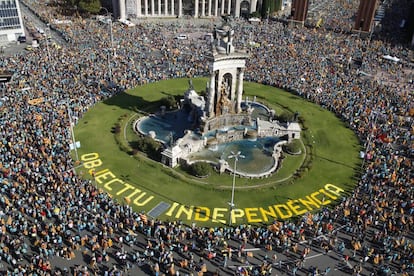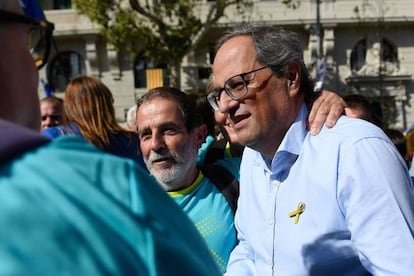On Catalonia Day, separatists vow to keep working for independence
Political division partly explains the lowest turnout in years at the Barcelona march on Wednesday

Supporters of independence observed Catalonia Day, known locally as the Diada, with a march that organizers meant as a show of force ahead of the upcoming verdict following the trial of secessionist leaders at Spain’s Supreme Court.
Around 600,000 demonstrators, according to the local police, gathered in Barcelona on Wednesday evening on the occasion of the anniversary of the fall of the city in 1714 during the War of Spanish Succession.
Así está ahora mismo Barcelona con la manifestación de la Diada con el lema "Objetivo independencia". El vídeo es de @jcatafiguls https://t.co/0z3B2quH6r pic.twitter.com/VIRwlajdBK
— EL PAÍS (@el_pais) September 11, 2019
They marched under the slogan “Objective: independence,” two years after a failed secession attempt that ended with the temporary suspension of regional self-rule.
Political division
The lower turnout compared with recent years can be partially explained by months of tension among the various political groups that support independence, public disagreements within the Catalan government, and difficulties crafting a common response to a potentially adverse Supreme Court decision.
In 2012, a pro-independence association named Catalan National Assembly turned a traditional street march held every September 11 into an expression of support for secession from Spain. Starting that year, when the independence movement gained significant momentum, attendance figures hovered around the one million mark, according to the Barcelona police. This year, the figure was closer to 600,000.
While the Catalan premier at the time, Carles Puigdemont, fled Spain with a few aides and settled down in Belgium, other members of his government were arrested and have been held in preventive prison since then. The Supreme Court, which tried 12 leaders of the illegal breakaway attempt in February, is expected to hand down a ruling on the case in the first half of October.
Leading members of the march made public statements promising to keep working toward independence, despite the fact that the separatist movement is now politically divided compared with 2017, the year of the unauthorized referendum and unilateral independence declaration.
“Today, there are thousands of us marching under a very simple slogan: ‘Objective: independence’ and that is our challenge,” said Quim Torra, the Catalan premier, at the end of the march. “Today, a period ends and the response to the ruling begins. We will put the goal of independence at the center of political action.”
“When injustice is the law, civil disobedience is a right, and we will not give up on defending our rights through non-violent struggle in order to change reality and unfair laws,” said Marcel Mauri, vice-president of the pro-independence association Omnium.

A new consensus
Earlier in the day, the rain did not prevent the traditional offering of flowers at the foot of the statue of Rafael Casanova, a hero of the 1714 Siege of Barcelona.
The speaker of the Catalan parliament, Roger Torrent, underscored that his predecessor Carme Forcadell remains in preventive custody while awaiting the Supreme Court decision. “We are part of another exceptional Diada due to the existence of political prisoners,” he said.
Torrent, of the Catalan Republican Party (ERC), thinks that the upcoming court ruling will open up a new political cycle in which it will be necessary to “build broad majorities, which exist in this country, who say they don’t want repression, that they want a democratic society and who share a republican agenda.”
The Catalan Socialist Party (PSC) and Units per Avançar (United to Move Forward) were the only non-separatist parties to take part in the flower ceremony, where they asked for a “new consensus” to bridge the divide between Catalans who are for and against independence.
Other non-nationalist parties made statements along those lines.
Hartos de que el separatismo nos excluya de una fiesta que debería ser de todos. Cansados de que Torra y su gobierno hable en nombre de todos los catalanes. Ni la #Diada ni Cataluña es solo de aquellos que quieren separarnos del resto de España. Avui i sempre #CataluñaSomosTodos pic.twitter.com/LHcAoxnlsT
— Laura Vílchez (@LauraVilchezS) September 11, 2019
“Tired of being excluded by separatists from a celebration that should belong to everyone. Tired of hearing [Catalonia’s separatist premier] Torra and his government speaking in the name of all Catalans. Neither the Diada nor Catalonia belong just to those who want to separate us from the rest of Spain,” tweeted Laura Vílchez of Ciudadanos.
English version by Susana Urra.
Tu suscripción se está usando en otro dispositivo
¿Quieres añadir otro usuario a tu suscripción?
Si continúas leyendo en este dispositivo, no se podrá leer en el otro.
FlechaTu suscripción se está usando en otro dispositivo y solo puedes acceder a EL PAÍS desde un dispositivo a la vez.
Si quieres compartir tu cuenta, cambia tu suscripción a la modalidad Premium, así podrás añadir otro usuario. Cada uno accederá con su propia cuenta de email, lo que os permitirá personalizar vuestra experiencia en EL PAÍS.
¿Tienes una suscripción de empresa? Accede aquí para contratar más cuentas.
En el caso de no saber quién está usando tu cuenta, te recomendamos cambiar tu contraseña aquí.
Si decides continuar compartiendo tu cuenta, este mensaje se mostrará en tu dispositivo y en el de la otra persona que está usando tu cuenta de forma indefinida, afectando a tu experiencia de lectura. Puedes consultar aquí los términos y condiciones de la suscripción digital.








































